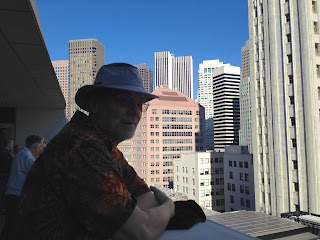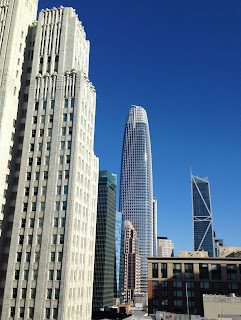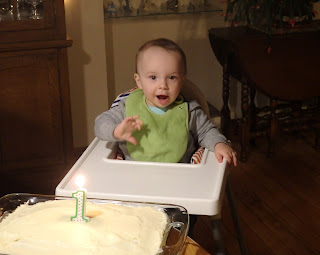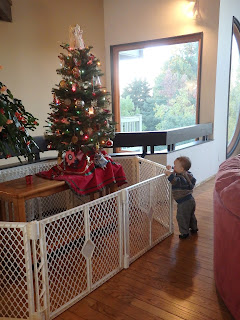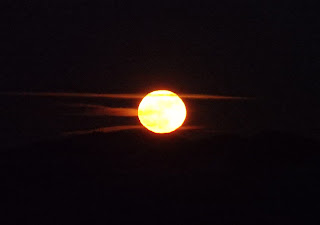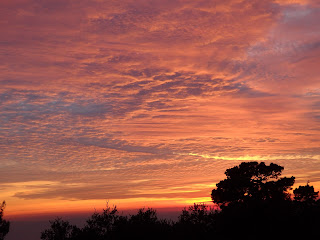Visiting SFMOMA during the Christmas holidays was suggested by a friend who also provided us tickets through their membership. The day after Christmas, the weather was perfect - mild and sunny - which is not always the case in San Francisco in December.
(All photos taken with my iPhone 5c. Click on a photo to see a larger version.)
 |
That's SFMOMA in the center.
Photo taken from the Yerba Buena Gardens. |
We focused on exhibits that were time sensitive, not part of the permanent collection. Soundtracks on the 7th floor was one of these.
 |
Cloud was one of my favorites.
I put on headphones and walked around the sculpture
feeling I could dance to the changes in sound. |
 |
Here's an explanation of the piece and information about the artist,
followed by a sketch showing the wiring. |
Both Erick and I agreed that this one was our very favorite from the Soundtracks exhibit:
 |
The porcelain bowls float and chime when they bump into each other.
It's a restful place amid the bustle of the other installations.
Information about the artist and the work is below. |
Here are some of the mechanical "orchestras" and "instruments" that we saw and heard in another section of the exhibit:
 |
They were on timers and played periodically
as people walked through. |
On the 5th floor, we encountered:
 |
As you can tell, neither Erick nor I are arachnophobes. |
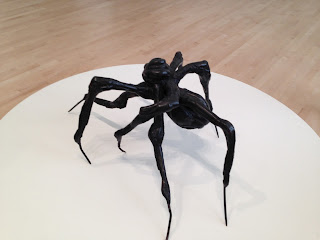 |
| The smallest one |
The Robert Rauschenberg exhibit, Erasing the Rules, was on the 4rd floor. The amount and variety of media he worked in is amazing. This one, Monogram, is among his most famous pieces. Created in the late 1950's, Monogram belongs to the series of Combines that Rauschenberg made between 1954 and 1964. A term coined by Rauschenberg, Combines merged aspects of painting and sculpture to become an entirely new artistic category. (Source: www.rauschenbergfoundation.org)
 |
Called Monogram because it reminded the artist of
the interweaving letters of a monogram. |
My interest in photography and in Alexander Calder's sculpture drew me to the 3rd floor.
A Walker Evans retrospective included portraits of everyday people, roadside attractions, postcards and tool catalog items. Evans was born in 1903 and died in 1975. He photographed in black & white, and later in color.
 |
| Photo portraits at the entrance to Part 2 of the exhibit |
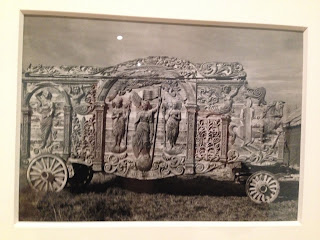 |
| Evans photo of a circus wagon |
Alexander Calder (1898 - 1976) was an American sculptor known as the originator of the mobile, a type of moving sculpture made with delicately balanced or suspended shapes that move in response to touch or air currents. He also created stabiles, non-moving pieces, some of monumental scale.
 |
| Small mobiles |
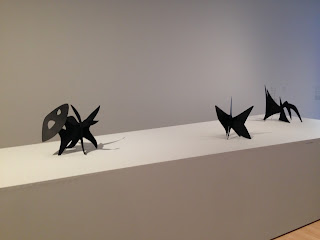 |
| Small stabiles |
 |
Indoor and outdoor stabiles
and a mobile |
Another of the temporary exhibits featured political posters from 1960's to now. If you are of a certain age, you'll likely remember some of the older ones.
As we passed through some of the ongoing exhibits, I took just a few photos.
 |
Furniture as art |
 |
| Andy Warhol's Jackie |
The museum has a living art installation, the living wall, and areas of outdoor sculpture, as well as terraces that provide some great views of local buildings.
 |
| The crowd entering as we were leaving SFMOMA |
 |
| Fountains at Yerba Buena Center for the Arts |
 |
| St Patrick's Church in the center |
 |
| The Marriott on Mission St |
 |
| Plantings and lighted tree in the Gardens |
Our vote for most unusual food service set up in the Metreon, CafeX. Yes, robotic coffee service.
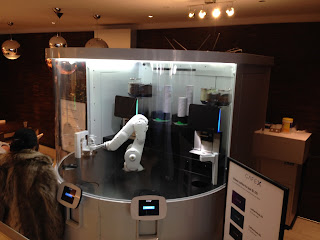 |
CafeX
Photo taken just after the robot waved goodbye to the customer |
To wrap up our excursion to the big city, Erick took me to see the new offices of a customer where he occasionally goes for meetings. It has all the essentials.
A short walk to the Montgomery St BART stop and we were on our way home.
























